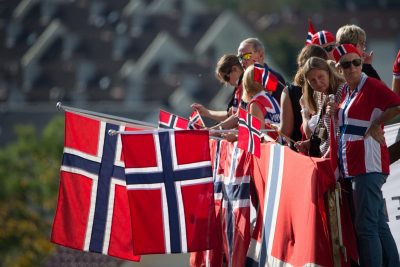Just two weeks after Norway’s annual display of enthusiastic patriotism comes news that a majority of Norwegians think their own culture is better than that of other countries. Norway was the only country of 15 Western European nations polled where more than half suggested cultural superiority.

It was newspaper Vårt Land (Our Country), perhaps not suprisingly given its name, that reported on the poll conducted by the Pew Research Center of the US. Fully 58 percent of Norwegians responded that they completely or mostly agreed with a statement that “Our people are not perfect, but our culture is superior to others.”
People questioned in Spain, meanwhile, were at the other end of the scale, with only 20 percent supporting the statement. In neighbouring Sweden, only 25 percent think their culture is best. The only country that comes close to Norway’s response is Switzerland, where 50 percent find their culture superior. Switzerland, like Norway, has never joined the European Union either.
The Pew Research Center interviewed 24,000 residents in the 15 countries for its survey entitled “Being Christian in Western Europe.” Among them were 1,500 Norwegians over the age of 18 who were chosen at random. The survey, which also showed Norway as having the lowest percentage (just 5) of church-attending Christians, nonetheless found that Christian identity in Europe remains a religious, social and cultural marker.
‘Smug and self-righteous’
Some may argue that Norway’s numbers simply represent Norwegians’ great sense of pride in their country and their systems, despite all the political quarreling that goes on every day. Professor Thomas Hylland Eriksen at the University of Oslo suggests otherwise.
“The numbers reflect widespread Norwegian smugness and self-righteousness,” Hylland told Vårt Land. He think that has strengthened in recent years, since Norway “became an absurdly wealthy country.”
Others argue the attitude can quickly become viewed as nationalistic in nature, and protectionist as well. Norway’s Center Party, which caters to a rural constituency and led the campaign against joining the EU, has seized on such attitudes in its efforts to protect farmers, glorify Norwegian-produced food and fight to keep remote areas populated.
“Our sucess lies in that we have managed to develop something more than a geographic fellowship,” Ola Borten Moe, who has served as deputy leader of the Center Party and as a goverment minister, wrote in a commentary for Norwegian Broadcasting (NRK) last year. “If Norway is to continue being Norway, we must continue to do that: Renew the country, change it, build new national self-confidence and new fellowship.”
Stressing identity and a sense of belonging
Moe, who recently became entangled in a sexual harassment case, argued that Norwegians’ “common arenas and reference points” are fewer than they were just 30 years ago. That makes it more important than ever, according to Moe, “to take care of what we have.” Despite increased diversity within Norway, the days of a strong national state are far from over, he claimed, adding that Norwegian identity and a sense of belonging tied to fellowship remain critical to ongoing development of the nation.
Moe and many others have argued that Norwegian culture and values are under pressure, but the country still ranks high on lists about the planet’s happiest people and in which country it’s best to live. Top spots on such lists are often shared with other Nordic countries. The Pew report showed that 49 percent of people questioned in Finland think their culture is better than others’, while 44 percent of those in Denmark felt the same. Norwegians remained the most satisfied.
(See the Pew’s own report on its findings here: external link to Pew Research Center’s website.)
newsinenglish.no/Nina Berglund

